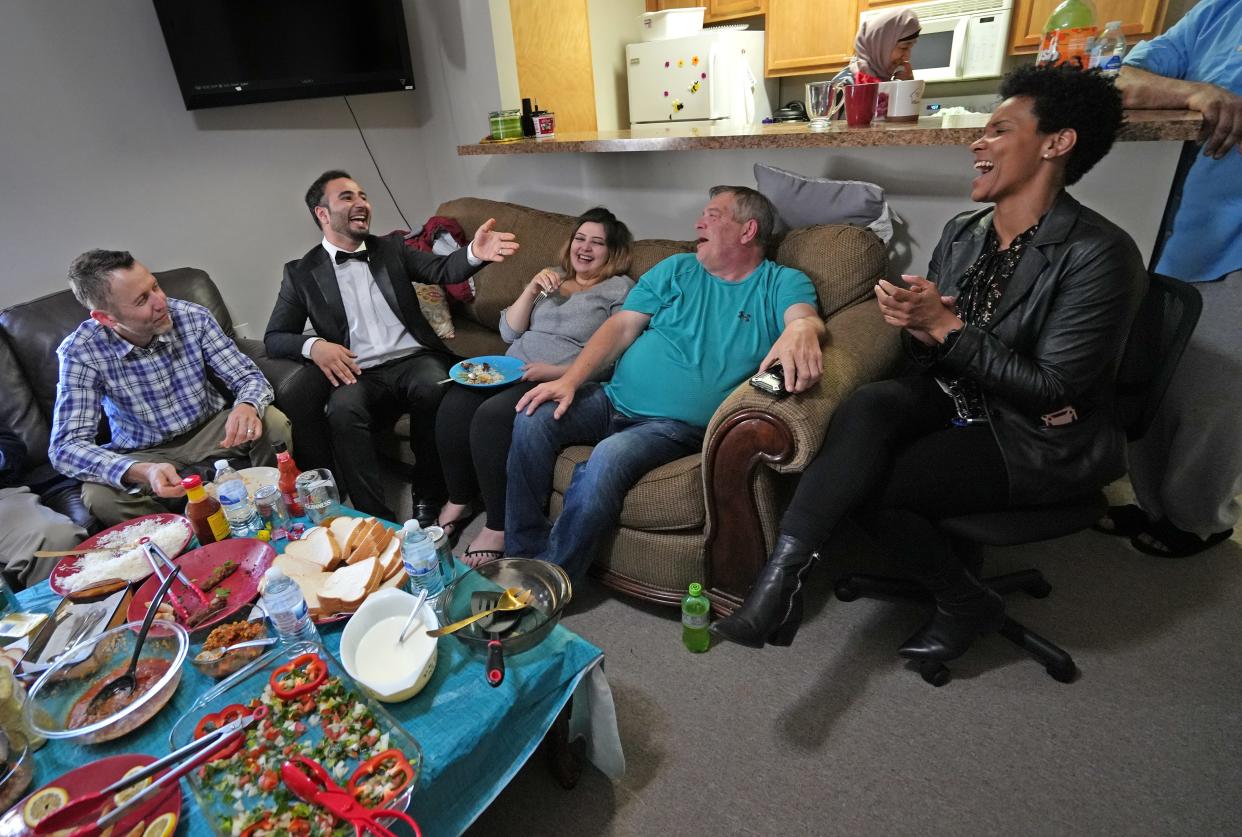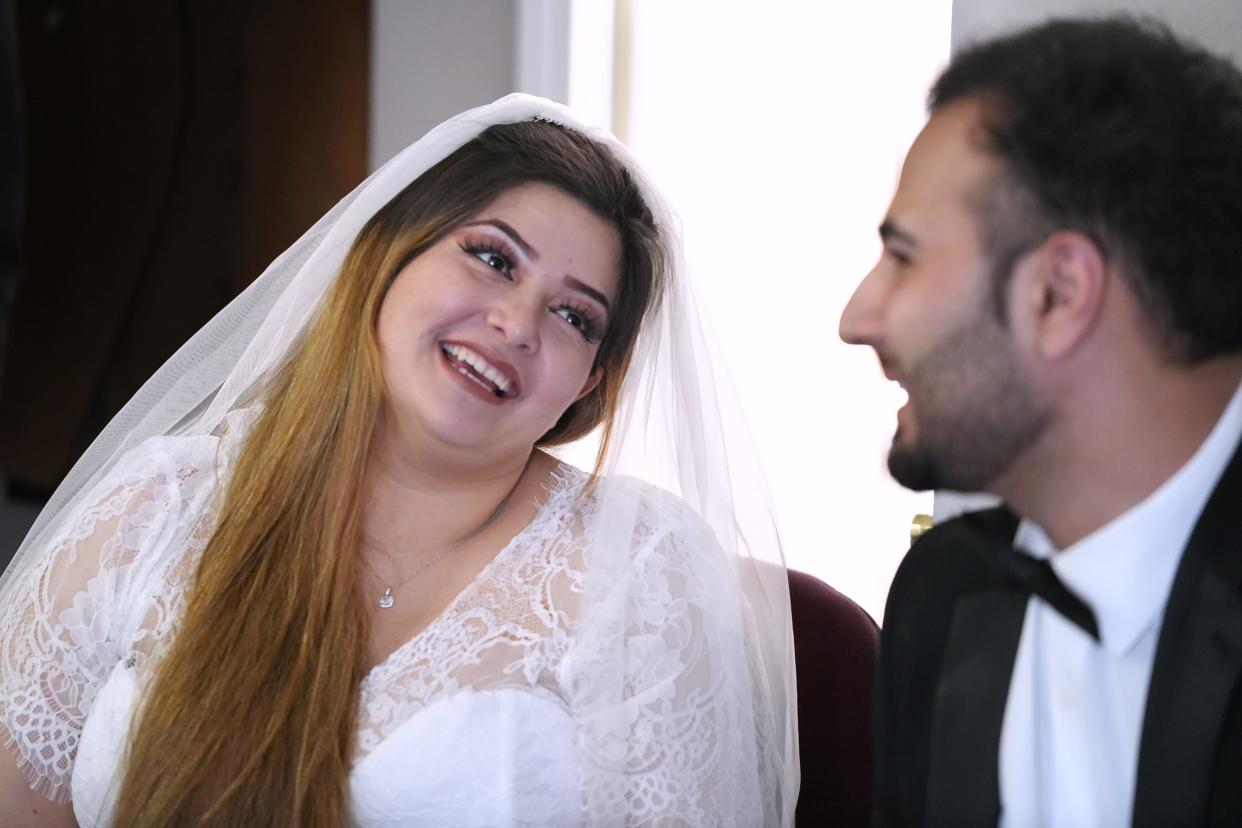An imam and a pastor married them. Finding faith and flexibility is America's 'best thing'
Editor's note: This story is part of an occasional series about the Akbarzadas and their journey in life and in love in the U.S.
The Vow, Act 1
“Marriage is a joyful time. When we think of weddings, we think about the charm of love, the warmth of home, and with all that is pleasant, as being one of the most important events in our lives. It's the most important and binding promise known to man.”
On a recent Sunday, the third day of Ramadan, a Christian pastor officiated a wedding for a young, Muslim couple.
"You guys ready?," the Rev. Chad McFadden began, in front of a small group of family and friends at an Indianapolis church.
With shy smiles and their fingers interlocked, Sulaman and Arzo Akbarzada walked down the aisle, wearing a black tuxedo and white gown they had worn before.
This was their third attempt to get married. They hoped this time would work.
On their first wedding day in August, they were forced into hiding after the Taliban took over Afghanistan and put their lives in danger. “If we stay, we die,” Sulaman remembers thinking. They escaped to the U.S. with their families and thousands of other Afghan citizens, whom the U.S. was welcoming as refugees.
On their second wedding day in October, new friends in Indiana — U.S. soldiers, state department officials, and volunteers — were so touched by the new couple’s plight, they put together a traditional wedding ceremony for them at Camp Atterbury, an Indiana National Guard training site. Sulaman, Arzo and about 7,200 other people were staying there temporarily as part of the government’s Afghan resettlement mission.
Love Movements: War disrupted their wedding. Love is helping them start a new life in Indiana
Camp Atterbury:Inside the Indiana camp housing thousands of Afghan evacuees
That wedding went well, and soon after, Sulaman and Arzo moved into their Indianapolis home, but after the initial marital bliss came … bureaucracy.
When they went to apply for their marriage license, they learned that their union wasn’t legitimate. They had no photo IDs or proof of residency at the time, which meant that despite the fanfare and photography at their Camp Atterbury ceremony, they were not technically married.
You have to get married again, Sulaman was told.
"Again??" he remembers thinking.
Story continues below gallery.
The Vow, Act 2
“To have and to hold from this day forward. For better, for worse. For richer, for poorer. In sickness and in health. To love and to cherish. For as long as we both shall live.”
Since leaving Afghanistan, Sulaman and Arzo had to take a leap of faith — as husband-and-wife and as new Americans — all while processing the astronomical life changes only immigrants can understand. Fleeing their homeland in crisis. Finding a home in a foreign country.
“Arzo was the one, she just helped me a lot (when I) suffered,” Sulaman said. One of the hardest parts of his journey has been leaving behind his sister in Afghanistan. In moments of pain, Arzo comforts him.
“She’s always giving me heart, strength and say(ing), like, ‘OK, you’re here, she will come. … Don’t worry about it.’”
They’re trying not to worry too much, but even here, challenges abound.
Sulaman has cared for his sick wife in the hospital. Arzo has worried for her husband when he works long hours.
They’ve been living out their wedding promises long before their ceremony in April, the “official” one that would cement their marriage on paper and in the eyes of the law.
Story continues below gallery.
Unlike their wedding at Camp Atterbury, this time, they got married by a pastor instead of an imam, who performed the ceremony in English instead of Arabic. They stood in a mostly empty church, with family members and a few close friends.
Sulaman grew up in a Muslim household, but he chose the church and a Christian pastor, the Rev. McFadden — not only due to chance and circumstance — but also because he’s always been open-minded about religion.
“It doesn’t matter,” Sulaman said. “(What) matters is, I promised my wife. … It’s all about the promise (you) make (to) your wife. That’s all.”
For years, Sulaman has been curious about different faiths, always asking questions “about everything,” he said. He has some general knowledge about other religions, but he wants to read each of their major texts, like the Bible and Torah.
"I really like to know my God, and I want to hear from (Him) himself,” Sulaman explained. "If I find my God in one religion, I will stick on that."
He wants to find what’s best for him. He wants to be firm in his faith. Here in his country, Sulaman said, he can do so freely and without fear.
“In America, the best thing is you can choose your own way,” Sulaman said. “In my country, no way.”
“You don't have a right even to (cut) your beard or (grow) it,” he added, for example.
The Taliban previously ruled Afghan society with a harsh interpretation of Islam, claiming that shaving or cutting beards goes against the religion. Remnants of that old governance appears to be coming back.
In September, the group ordered barbershops in one region to stop shaving or trimming beards, according to the Associated Press. Last month, Reuters reported that the Taliban has instituted a rule requiring all government employees to wear beards and follow their dress code, or get fired.
Since being in Indiana for the last seven months, Sulaman has changed his facial hair multiple times, going from a trimmed beard to a clean-shaven face back to the bearded look.
He's always appreciated American culture, learning English through Hollywood movies and rap music. He lists off 50 Cent, Akon, Eminem, Tupac, Dr. Dre, saying “they were my teacher.” After they got engaged in Afghanistan, he took Arzo on dates to eat pizza and chicken wings.
Deep down, he always envisioned himself coming to America one day.
Today, he’s here, in a dream born out of a nightmare scenario. But he’s here.
“I'm here. I'm free,” Sulaman said. “I can choose by my own.”
The Vow, Act 3
“The rings are a symbol of the promises that you've made to one another. Their unending circle, as a picture of your love for one another, is to be unending in this life. It's made from precious metal to show that this relationship is to be valued higher than anything else.”
On Sulaman and Arzo’s “redo” wedding day, a mix of beliefs and backgrounds came together in an intimate family gathering.
McFadden, the Christian pastor, quoted the Bible and helped the couple get married in a church. Before and after the ceremony, Sulaman’s parents, Parwin and Dawood Akbarzada, and his brothers prayed, five times throughout the day, toward the holy land Mecca, for Ramadan.
They fasted that day, too, but still, they cooked and graciously served a homemade Afghan meal of white rice, kabobs and curries of meat and lentils for their guests — new friends who are now chosen family.
The pastor, his wife and four young kids. Their refugee case worker. A state employee and Indiana National Guard soldier who were stationed at Camp Atterbury. All have helped the Akbarzada family adjust to life in America.
Sitting around a living room coffee table, they feasted on the food and each other's company.

Parwin, Sulaman's mother, made a point to meet the pastor's kids — she loves kids, Sulaman explained. Larry Cassagne, a family friend, joked about how Arzo seemed to have picked up his Mountain Dew habit. They stayed for hours.
“In our culture, we say guests are like God’s guests,” Dawood, Sulaman's father, smiled and said in Hindi, one of several languages he speaks. “It brings happiness.”
The Akbarzada family came to America to be accepted, but now that they're here, they are accepting and welcoming others in their home, too.
“It’s amazing, I was sitting in the room … looking at just all the different backgrounds that were there,” McFadden said. “And to think that only God could bring a friendship in all of that and unity, and to be able to love one another."
Sulaman recently requested a Bible in Dari, which McFadden was able to order for him from Canada. And after meeting the Akbarzadas and previous years of hosting foreign exchange students, McFadden, too, is now studying the Quran to better understand Islam.

Though his family fasted that day, Sulaman did not. He wanted to support Arzo, who was not fasting.
It was his choice.
Soon, Sulaman and Arzo will be able to pass that gift along as parents.
The couple has a baby boy due in November.
"I will not force him with anything," Sulaman said. "He can go and see and find. I will support him until I die. I will support him ... until he finds his way."
Contact Rashika Jaipuriar at rjaipuriar@gannett.com and follow her on Twitter @rashikajpr.
This article originally appeared on Indianapolis Star: After fleeing Afghanistan, Indianapolis couple finds faith in Indiana
